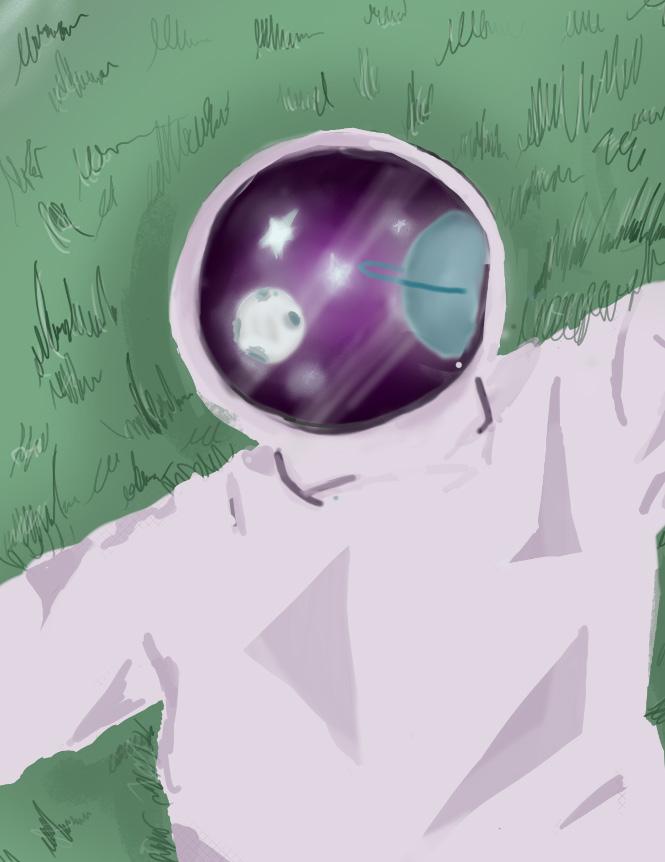By teens, for teens





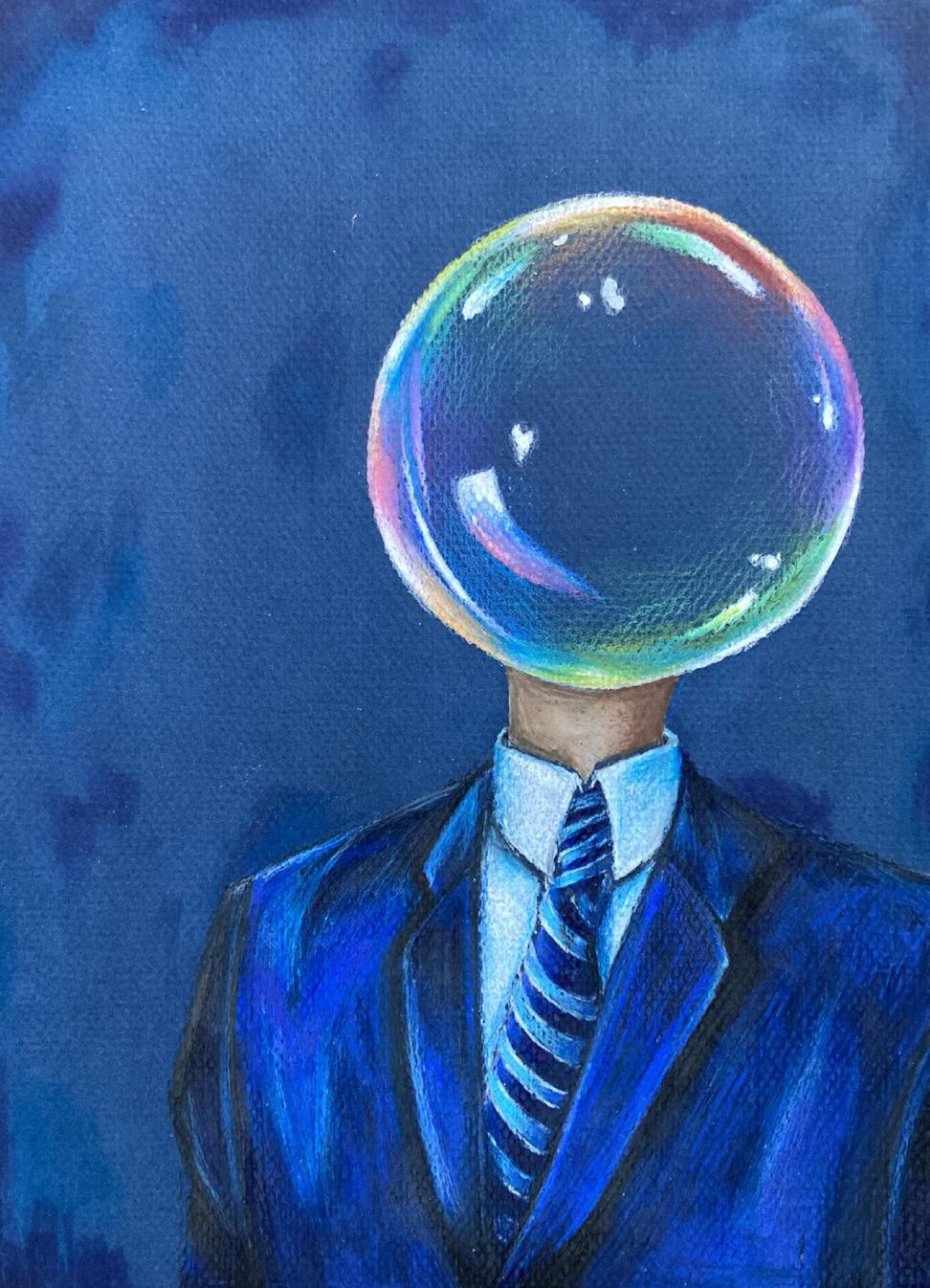
5
The Next Step Dream Big!
The Survival Guide to Adulting To Young Students
A Different Path
13 Testing & Admissions
The Problem with Tests
From Rejection to the Elitism Divide
17
Choosing a Career
My Career or my Parents’?
Interested in Flight?
Choosing a Career: Physician Assistant
23 Finance in Education
Practical Strategies for College Students
Digital Downloads VS Paper Purchases 28 Poetry


Welcome back to another issue of Teen Ink magazine! This edition is all about college — something that has a huge impact on many teens around the world. Whether you're considering college, have already made a decision, or are still determining what you want to do, this issue has plenty of content for you!
Inside, you will find content focusing on various college-related topics, including the rising cost of textbooks, career choices, and even alternate paths after high school. We've also included a poetry section and have showcased some incredible artwork for you to enjoy.
Do you have exciting plans for your future after high school? Share your thoughts with Teen Ink! We would love to hear all about your opinions on college and how it impacts you.
We hope you enjoy this issue just as much as we do, and as always, we welcome your feedback! If you want to write a letter to an editor or respond to an opinion article, visit teenink.com/submit!
Best regards,
The Teen Ink Team
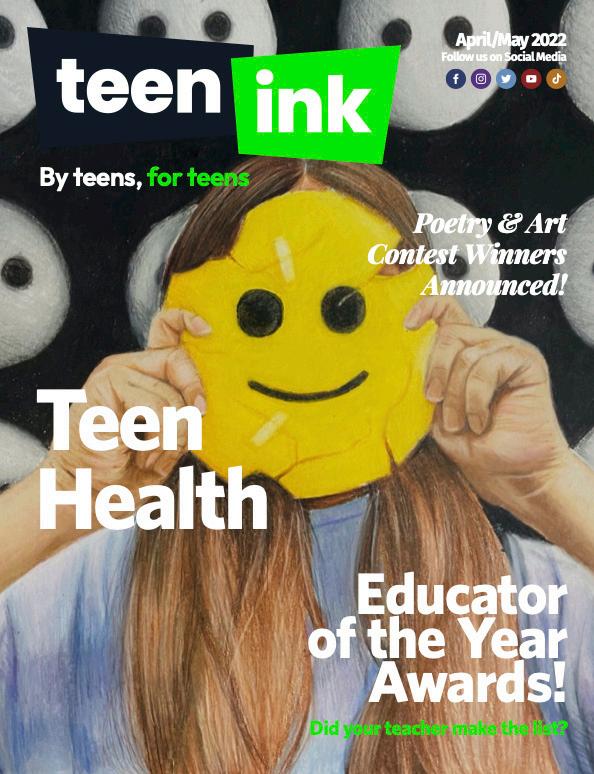

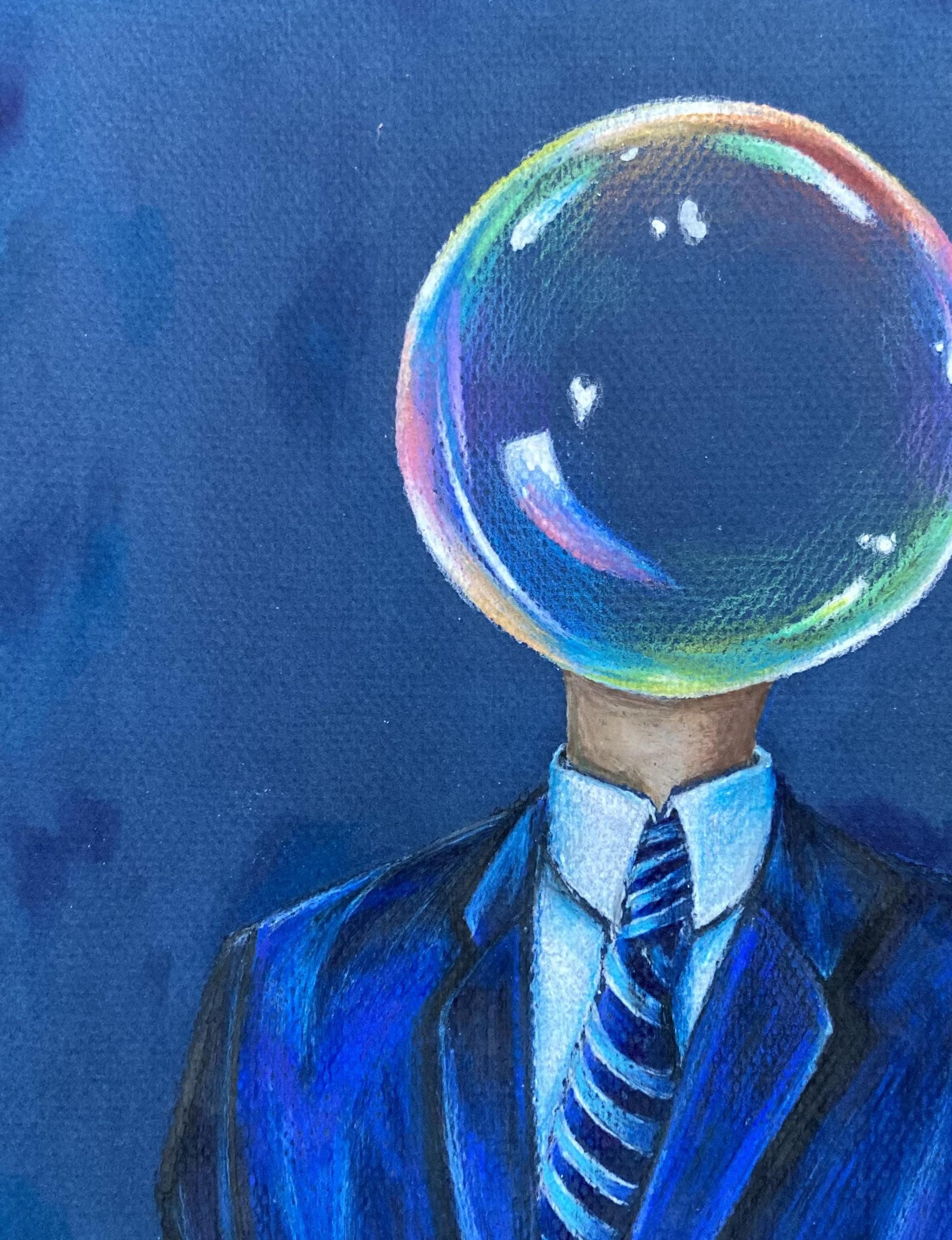
 ARTICLE BY DAYLON LOPEZ-REYNA, MELBOURNE, FL
ARTICLE BY DAYLON LOPEZ-REYNA, MELBOURNE, FL
Growing up is a part of my life that has changed my perspective on it time and time again. It has made me question things like what I want to do when I’m older and how I am going to accomplish that for myself. At a young age, this isn’t the easiest to find, but it has given me motivation to create a plan for my future. That being said, my biggest fear is being unsuccessful in life which is why I’ve set goals for myself to become successful.
I’ve already completed some goals such as challenging myself with harder classes in school and saving money responsibly. I used to want to achieve more than my parents but with some aspects, I already have so I’ve decided to set even higher goals for myself. This is why I’ve decided to go to college to gain an even higher education to prepare me for my future career.
At first, college never crossed my mind, but after maturing, I became more open to the idea and gained a new understanding of what I wanted to do with my life. Something clicked in my head, pushing me to start planning out ideas so I could succeed and have an easier life later down the road. It happened out of nowhere, but I think what triggered this was fear.
The thought of struggling again, as I’ve seen it happen first-hand, helped to change my mindset. It motivated me to pursue what I wanted. I believe anything is possible if you put your mind to it, and I plan to keep that mindset.
I am even setting goals after college to apprentice under different electricians and master the field I’m best suited for. Then, I can use what I learned in college with a business degree to further that profession and own my own business one
...I'VE DECIDED TO GO TO COLLEGE TO GAIN AN EVEN HIGHER EDUCATION TO PREPARE ME FOR MY FUTURE CAREER
day. After that, I can pay others to do the job for me while running it from behind. I’m always thinking ahead along with the importance of my future and career.
However, while I devised a plan and stuck to it, it didn’t come easily. It took a lot of time and effort to put this plan together. I took time to gather income, pay college requirements, and achieve good grades on time so I could make college and life in general much easier down the road. Needless to say, it was all well worth it as I am about to graduate and enroll in a brand new school in the fall. It’s an exciting experience to look forward to, but not something to take for granted, and I know that I will be fine as long as I stay motivated and continue with the same mindset I had in the beginning.
 ARTICLE BY ANONYMOUS
ARTICLE BY ANONYMOUS
ARTWORK BY
ELLIE BRUBAKER, HOUGHTON, NYWelcome, fellow adventurers, to the journey known as adulting! As we navigate the treacherous waters of bills, responsibilities, and existential crises, it becomes abundantly clear that there is no handbook for this chaotic adventure. However, fear not, for I propose a solution — the “Survival Guide to Adulting,” infused with wit to help us tackle the stormy seas of adulting with a smile and a pep. Let us embark on this quest together.
Ah, adulthood — a magical realm where the dishwasher is always full, and the laundry basket is never empty. In this section, we shall explore the challenges that await us on our journey through the land of grown-ups. From navigating the mysterious realms of taxes to mastering the ancient art of grocery shopping without buying everything in sight, we shall face each obstacle with courage and a healthy dose of sarcasm.
Now, dear comrades, it is time to unveil the secrets of survival in the wild world of adulthood. Our “Survival Guide to Adulting” shall be our trusty companion, filled with practical tips, tricks, and life hacks to help us emerge victorious in adversity. Need to iron a shirt without setting your house on fire? We've got you covered. Need help figuring out how to assemble that IKEA wardrobe or bed frame without curing up a storm? Fear not, for salvation is at hand.
Nevertheless– wait, there is more! As we journey through the chaotic landscape of becoming an adult, let us remember to embrace the absurdity of everything. From the awkward encounter with exes you met on Tinder in the grocery store to existential cries over the meaning of life while folding laundry, difficulty can be found in every situation. Let us laugh in the face of adversity and find joy in the absurdity of the human experience.
In our quest for adulting mastery, we must also embrace the art of time management, a skill as old as time. As we juggle work, social life, and personal passions, time seems to slip through our fingers like sand in an hourglass. However, fear not, for within the pages of our “Survival Guide to Adulting” lie the secrets of effective time management. From prioritizing tasks to utilizing productive techniques like the checklist method, we shall reclaim our days from procrastination and emerge as masters of our destinies.
As we journey onward, let us also recognize the importance of community in our adventures through adulthood. We may be the protagonists of our own stories, but we are not alone in this grand saga. Friends, family, mentors, and even the strangers we meet along the way provide invaluable support, guidance, and companionship. Whether it is sharing a laugh over shared struggles or lending a helping hand in times of need, our connections with others enrich the happiness in our lives. So, let us cherish the bonds we forge and remember that we are stronger, wiser, and more capable of conquering the challenges ahead.
My fellow adventurers, the “Survival Guide to Adulting” is not just a mere handbook — it is a manifesto for living life to the fullest, even when faced with the most mundane tasks. Armed with resilience and a healthy dose of selfdeprecation, we shall conquer the wilds of adulthood and emerge victorious on the other side. So, don't feel like you have been thrown into the lion's den with a steak strapped to your chest when you start college or graduate. Let us embark on this journey together, for the adventure of our lifetime awaits us all in the great unknown of adulting.

To young students,
What do your grades look like in school? Do you take classes outside of school to boost your grades? What extracurricular activities are you pursuing right now? Were these chosen by you or your parents? Do you enjoy the activities you participate in, or do you continue because you’re forced into them? Do you have a dream college? If so, is that school one of the best in
the country or a legacy from your parents?
I, like many students around the country, have reached for perfect grades and stellar extracurriculars pushed on me by my parents. Ever since I was a child, I’ve held aspirations of future colleges with ambitions that more reflected the expectations of my family and less of my own desires. The only school that dared meet my lofty
dreams was Stanford University, or in my eyes, the epitome of intellect. I didn’t know their alumni, didn’t know their programs, and likely had no idea what their mascot was. Yet I knew it was world-renowned, a cesspool of brilliance, and only invited the best of the best.
Being a naive overachiever, I believed I was one of them. I believed I could be accepted to go to the top university. At the
beginning of my freshman year during an online advisory meeting, my counselor said the highest GPA she’s ever seen in a student was a weighted 4.83. From that moment on, I knew where my ambitions lay: in an arbitrary number that would end up defining my intellect. The higher my GPA was, the smarter I was. I took four AP courses in my sophomore year, seven AP courses in my junior year, and likely, just as many in my senior year. I took as many AP classes as I could get my hands on and signed GPA waivers to make my weighted GPA as high as possible. I had been led to believe that my grades in school determined my worthiness for prestige.
Not only is this how I felt about school, but also how I viewed my athletic career. I have swum since I was four years old and competitively since I was nine. I’ve wanted to swim in college since I was 11. In the midst of the COVID-19 pandemic and during my Freshman season, though State was canceled, I broke a school record and held the thirdfastest 100 backstroke time in school history. I relentlessly pursued my goals, yet never felt short of feeling lackluster and unaccomplished. I never felt like I was doing enough; never fast enough or smart enough, doing enough extracurricular activities or attending different meetings, or joining enough clubs. Every time I reached a bar, my mind would raise it again, never once grazing it, let alone holding a firm hand over it.
disappointment. Not only had I not beaten my previous year’s times, but I also fell short of my goals. Disappointment seeped through every crevice of my mind, bleeding into my thoughts and self-worth. During this time, many athletes can begin to look at universities and contact coaches in hopes of developing a relationship into a potential offer. I had lost hope in any elite institution. Why should my dreams stand so tall when I always fell so short?
Junior year blessed me in a way that overcompensated for the losses I experienced the year prior. I broke three school records, becoming the fastest backstroker in my school’s history, and ranking 60th in the nation. However, these accomplishments are ideas I
attend? Why do I never feel adequate enough to attend any of these schools? Why do I feel inadequate when I don’t attend one of these schools?
My dad has always told me, “It matters less of where you go and more of what you do there.”
IN HIGH SCHOOL, REMEMBER TO TRY TO EXPLORE NEW THINGS, FIND YOUR INTERESTS, AND DISCOVER A FEW HOBBIES...
can barely recollect without weariness since I was seeded to win state, fated to be a state champion, yet not even making it to the top three. Though I know wherever I go I will attend a university that makes me feel joy towards the prospect of my future, I still cannot help but feel a fear of disappointment — disappointment from others that I won’t be going to an Ivy, Stanford, or MIT.
It’s easy for one to believe the name of their university will be a focal point of judgment. Finding your interests and developing your passions in high school is infinitely more important than trying to reach for the top of a list published by U.S. News & World Report. I say this even when I still struggle to believe it. The competitive environment that I grew and thrived in molded me into believing that reaching the pinnacle is the only embodiment of success. Even when I am in college, I know my fear of disappointment will accompany me, but it’s important to recognize that the need for perfection is ill-fated. You don’t need to worry about trying to create the perfect resume for an admission officer because you will be brought by your actions, not the decisions of others. In high school, remember to try to explore new things, find your interests, and discover a few hobbies instead of just trying to take the hardest classes possible to improve your GPA by 0.01.
In the following sophomore season, I felt nothing less than a
Why are these values instilled in me where my perception of a “good” education can only come from one of the “elite?” Why do I believe my future is rooted in which university I
All the best, A regular high school senior.

Many people, including myself, have a life plan ingrained in their brains from a young age that after high school you must go to college; and after college, one will get a good job because you will be educated. That is just how life goes. While going to college is not completely out of my life plan, it is just not something I want to do right after high school if I had the choice. This plan is not a reality for me, but a dream if I had no restrictions.
If I had no restrictions for my plans after high school, I would not want to go to school right away. I would like to take a gap year after high school instead. During this time I would travel, but also fulfill a dream of mine of spending time volunteering in Africa. Although I have been thinking about this for some time, it has never been a reality. Helping kids in Africa and putting a smile on their faces is something that would make me happy, and is something that I want to do in my life. And what better time than when I am young and full of enthusiasm?
During my gap year, I would like to travel to some of my dream destinations such as Bali, the Maldives, and Iceland. Although my travel aspirations are more than the few places just listed and consist of places I will probably never visit during my lifetime, being a tourist in these countries is a dream. Traveling, touring, and trekking through other parts of the world and seeing
new incredible sights is a way to see other cultures. Through my travels so far, I have been able to see different customs and cultures in different countries. For example, the wild pigs on the beaches of Costa Rica were normal to the locals. The everyday normalities that were different from America are what makes traveling so interesting and educational. Although during this time, I would not be in school, I would still be learning and gaining experiences that would help me in the future.
Traveling is how I would spend about six months of my gap year; but for the rest of the year, I would be volunteering in Africa, teaching young kids how to read, write, and play games. As I have done more research about volunteering, I have found that many people teach English to children, as well as teach them sports such as soccer. Seeing the smiles that volunteers can put on kids' faces and the bond they build with them is something that I want to experience, plus, I want to make them happy.
While my ideal path for my future is a bit out of the ordinary, it is still not a reality for me. This plan is hopefully something that I will be fortunate enough to complete later in my life. Although I have a different plan than many, it is something that I am passionate about and would do if I was given the opportunity.

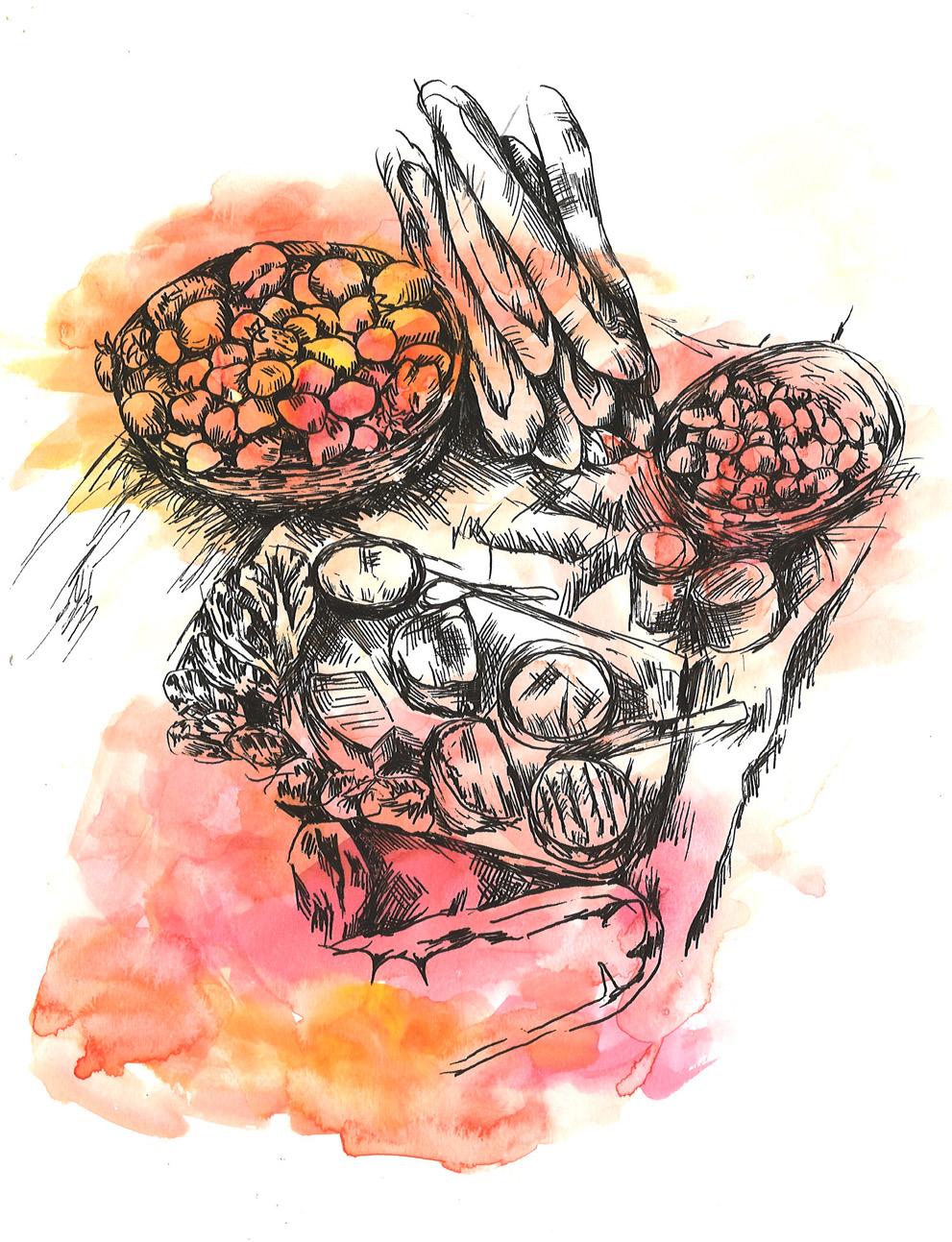
CREDITS
1. ARTWORK BY CHENGLIN WU, YANTAI, CHINA
2. ARTWORK BY ALEXIS CHOI, SEOUL, SOUTH KOREA
3. PHOTO BY CHERRY GAO, NEWTOWN, PA


Whether it be the testing of a squire’s bravery and skill in battle during medieval times to become a knight, or our now standardized tests such as EOCs, SATs, and ACTs, tests have always been an integral part of our societies. According to the College Board, over 1.7 million people from the class of 2022 alone took the SAT. Knowing this, you would think that tests, in general, would just be another thing in life we have to get through. And, in most cases, they are.
For me personally, I have always had this love-hate relationship with tests. I never disliked them because I was a bad test taker. I am an arguably good one. I’ve never hated a test because of what’s on it. Well… maybe that’s not entirely the case, but Pre-Cal tests almost belong in their own category. It’s more so what all tests bring no matter what subject, no matter if it’s five or 20 percent of my grade. With just the word “test” suddenly anxiety and fear become the lead roles at the forefront of my mind. The problem in itself was never the chance of making a bad grade or even feeling awkward with a teacher because they, too, know you made a mistake. The real problem was that if I made a mistake, I suddenly felt less. Less intelligent, less capable, less me. It never mattered if it was a spelling error or a completely miscalculated math problem, to me they still read the same, “mistake.”
I remember one night vividly when I was doing one of the quizzes in Pre-Cal. For reference, quizzes in Pre-Cal were both a quiz in itself as well as a way to study for the upcoming test soon after. I was sitting at our dining room table, my laptop open to the quiz, and a large notepad filled with synthetic division as I tried to find the upper and lower bounds of the equation on my screen. Every time the equation didn’t work out and I would again end up with a wrong answer, all I could think about was how bad I was going to do on the test. Once you go down that rabbit hole of defeat, you eventually come to the realization that the light seems further away the more you sink into it. On this night, every wrong problem took a shred of confidence with it, and with that shred of confidence also went my ability to calculate the problems accurately.
The problem with tests, or school in general for that matter, is that neither can ever truly measure a student’s intelligence. Tests in school are by definition supposed to “measure proficiency or knowledge,” but the problem lies with what tests will never be able to account for. It’s the off days, the test anxiety, and the spiraling. During a test, a student is more likely to make a mistake. This is purely because, as research proves, stress increases the likelihood of a
mistake. There are plenty of highly intelligent students that are just bad test takers. These students are then seen as ‘less intelligent’ or ‘less smart’ based purely on a few one-time grades that happen to account for more of their overall grade. Based on our current school system you can be a wonderful student who does all of their work on time and puts in the extra effort, but in the end, it comes down to those moments when your anxiety is high and your brain is blanking.
To top it all off, schools have these wonderful things called “rankings.” In these rankings, the tests are what matter, where your stress levels are high and you are statistically more likely to make mistakes because of it, they are what matter. The school’s system of intelligence then becomes a measurement of lowperformance anxiety rather than a true measure of how proficient a student is in a subject. The problem arises when students get too caught up in their rankings and begin to believe they are less intelligent or believe they are defined by them. The idea that you are less than your peers or the pressure of maintaining your current rank can be detrimental to a student. This pressure can then affect their performance in school, causing a downhill spiral. It may start with a bad test grade, but the lack of confidence gained from that one experience could lead to a ‘bad’ average or rank overall. Intelligence, in schools, is not true intelligence no matter how much we get caught up in the idea of grades and rankings.
It is the students who ultimately suffer the consequences of how we are ranked in school. It is the system of how our grades are measured that has distorted society’s interpretation of intelligence for young minds. This system encourages the need for something within young people that is essentially impossible, perfection. This idea that perfection is the best way to succeed has only led to lower self-esteem when students, being the humans they are, inevitably make a mistake. The system has fed into the idea that mistakes make you less, rather than the idea that mistakes, no matter if they are on math or history tests, are what undeniably make us human.
Saying this, I still become attached to my class averages, test grades, and ranking. Tests, whenever I get a good grade, still make me happy. I am not saying that studying is not important and it cannot help your grade, because it can. But I am saying that off days and stress exist and your grade and confidence can be affected by them. I am also not saying that I have a better option for the way our intelligence is measured in school because tests do inevitably reveal if you know a subject well or not in that one given moment. I do, however, believe that the current system cannot measure true proficiency because of the anxiety and stress that a test will never be able to account for. I also believe that this system pushes aside its fundamental purpose in favor of a ‘perfectionist’ agenda.

On March 31st, I opened my last college decision letter from Duke University. Possessing an admissions rate hovering around six percent, Duke is a powerhouse in the field of economics and forms a third of the elusive Research Triangle in the Raleigh-DurhamChapel Hill area of North Carolina. My mouse wandered over to the admissions button, my eyes sauntering across the home page. The rejection letter stared back at me, unblinking, stoic.
I closed the tab silently and shut off my computer.
From 2007 to 2021, admissions rates in many popular, private, nonprofit, four-year universities and colleges tanked. It is evident in Williams College’s 17.4 percent plunge to 8 percent, in UChicago’s 34.9 percent falling to 6.2 percent, in Tulane’s 44 percent spiraling to 9.73 percent. To the average adult, these figures may be surprising, but to so many American high schoolers heedlessly stacking Advanced Placement classes, studying until three in the morning for the dreaded SAT, and spending thousands on a private college counselor, these figures are a fact of life.
Despite this, according to Forbes, college enrollment has been decreasing for years and hit a record low of a 4.9 percent drop in undergraduate students nationwide in 2021. Post-pandemic
work shortages have made the job market increasingly accessible to those without a college degree, and the bad aftertaste of financial insecurity convinced many poorer would-be college students to put off further schooling for at least a few years.
These two conflicting findings point to one cause: the disparity between private, nonprofit universities — like Harvard University, California Institute of Technology, University of Notre Dame — and, well, everyone else who is not as popular. Frankly, students nationwide yearn for the sweet, sweet stamp of success only a famous, acclaimed college or university can give them. For those colleges, admission rates are increasing. For others, it is plummeting, causing a frenzied rush of layoffs, cuts to academic and extracurricular programs, and even the merging of colleges to consolidate financial resources.
Newark campus have done a much better job integrating with their environments than elite private universities,” which opens the doorway for many toward actual, effective student activism and a more down-to-earth mindset and awareness of the society they live in.
In a broader sense, these colleges serve the underrepresented and disadvantaged within their community, offering them a hopeful ticket to a better life. But this tradeoff works both ways — these colleges, and only these colleges, will suffer enrollment issues because it is the underrepresented and disadvantaged who now have to make the decision between short-
THIS DIVIDE BETWEEN ELITE AND NON-ELITE COLLEGES DRAWS A PARALLEL BETWEEN THE POOR AND THE WEALTHY
Why even worry about these less-competitive colleges if they themselves aren’t competitive enough to endure the lack of applicants? The largest reason is that this divide between elite and non-elite colleges draws a parallel between the poor and the wealthy, the in-touch and the out-of-touch. As a New York Times article states, “By and large, urban state universities like Rutgers University’s
term versus long-term financial security. In working towards themes such as togetherness and connectivity — themes fervently debated and questioned postpandemic, post-BLM, post-#MeToo — it is essential to look at our schools, at our places of education, to see where this gap occurs.

MY CAREER OR MY PARENTS'? MY CAREER OR MY PARENTS'?
ARTICLE BY MATTHEW ACEVEDO, MANCHESTER, CT ARTWORK BY LYDIA VAZ, SAN JOSE, CAI can remember the wince in my mother’s face and the tone of disappointment in her voice when I told her that I wanted to change my major from sports management to secondary education. “Yikes, you really want to go into education? I liked sports management better,” she said and then proceeded to explain why. This statement comes from my mother who doesn’t know much about either of those fields of study and also never went to college for her profession. Even with that in mind, her disgusted-sounding comment alone made me second guess changing my major to something I actually want to do as opposed to what she thought sounded better.
My mother isn’t much different from many other parents when it comes to their children's future and career choices. Many parents have a preset notion of what a successful child looks like — good grades in school, going to college, getting a degree, and having a high-paying job. The problem is that in this path of success, some parents tend to not take into consideration what their child wants or what will make them happy. This doesn’t mean parents want their children to be miserable and rich; they just want the best for their children. Therefore, parents will naturally want to influence their child's decisions into their idea of good and bad. Even seemingly harmless remarks and input, like my mom's, can sway children into feeling obligated to make certain choices.
we hate going to school, so the thought of four to six more years of education isn’t the greatest sounding idea; but in the eyes of our parents, college seems like the only option or else we are going to disappoint them. While they were pushing us to be college scholars, they were also unknowingly doing us a great disservice as student loans are America’s fastest-growing category of debt with a staggering $1.57 trillion and counting according to Forbes.
The authoritative influence our parents have goes beyond just making those major higher education decisions. Fresh out of graduation we are already pressured to get a career and make the decision of what we’ll do for the rest of our lives. Parents continue to behave in ways that make us feel we don’t have many options for our careers. In their efforts, parents again pressure their kids on career choices. The study unveils that 40 percent of all respondents felt pressured by their parents to enter their current career, according to Parents Magazine. The same joblist study then measured that a quarter of parents used guilt to influence their child's decision. Whether it be about higher income or just wanting their child to go into the same field as them, it is blatant manipulation to guilt someone into a career.
PARENTS SHOULD ASK THEIR CHILDREN WHAT THEY ARE GOOD AT TO ENSURE THEY WILL BE SUCCESSFUL IN THEIR CHOICE
The sense of obligation to fulfill our parents' expectations is not uncommon. In high school, we often feel pressure to go to college and meet their definition of success, or risk being seen as a disappointment to them. Forbes did a recent article covering a Joblist study that analyzed the extent of parent influence on careers. The study revealed that 58 percent of Millenials and 57 percent of Gen-Z respondents reported that they felt their parents forced them to attend college. Naturally, as teenagers in high school,
These parents in this study are not bad parents. In fact, their intentions make them somewhat great parents because all they ever want is for their children to succeed. This should not fully discourage parents from being a part of their child’s future, but there are better ways to be involved. Parents should ask their children what they are good at to ensure they will be successful in their choice. Then, they should put their own personal wants away, and ask them what they want instead of just telling them what they should and making them feel like a disappointment for wanting something different.
Look at the title. The answer is simple: It's not my parents' career; it's mine.
 ARTICLE BY MICHAEL VELLUCCI, EAST GREENWICH, RI
PHOTO BY SU MINGXUAN, GUANGZHOU, CHINA
ARTICLE BY MICHAEL VELLUCCI, EAST GREENWICH, RI
PHOTO BY SU MINGXUAN, GUANGZHOU, CHINA
For as long as I can remember, my head has been in the clouds. I grew up listening to thrilling stories of my dad’s adventures on the Air Force’s Special Tactics Team. One day, he’d be cascading out of a plane to rescue a fallen member of the military. On another, he might be racing across state borders to assist a citizen in need.
My dad’s anecdotes always captured my attention, but I learned early on that I wanted to be a commercial pilot, and his work was far more specialized. Unfortunately, there are not a lot of resources available to teens looking to make sense of the wide world of aviation. Just think of the array of careers available in this line of work, from a pilot, of course, but also air traffic controllers, airplane mechanics, aerospace engineers, and members of the landing crew. The reality, though, is that while all of these careers require baseline knowledge of how a plane functions and sky conditions, these lines of work are actually quite different.
I found it difficult to identify a mentor who could help me figure out the right way to pursue my interest in becoming a pilot. I talked to the parents of friends who worked in the industry, and I scouted out opportunities to make new connections through those I knew from flight training school. However, I recognized that much of what I know about this field comes through self-study and informal networking.
Recently, I created the organization Fly High as a resource for other teens looking to learn more about aviation. But I want to share what I’ve learned a bit more widely, which is why I am writing this article.
We’re currently in the midst of a major pilot shortage, and I can’t help but wonder, does some of this have to do with the fact that so many teens simply aren’t exposed to this career path and don’t know the options available to them in this industry? Researchers from the firm Oliver Wyman indicated that airlines in North America, in particular, will need approximately 30,000 more pilots by 2032 in order to maintain the transportation standards we have become accustomed to in our lives (Schonland). If we can’t garner student interest in this topic, it’s unlikely we will be in the position to meet the industry’s needs ten years or so from now, and part of this work involves making sure that students with a burgeoning passion for aviation know the paths available to them to prepare for this career. Despite the country’s emphasis on STEM education, only 240 high schools in the United States include aviation in their programming (Camera). From personal experience, I know that some states likely provide opportunities to learn this material more often than others. But how can someone interested in
aerospace engineering, for example, actually propel themselves toward success in this field if high school STEM programs largely exclude these topics from their curriculums?
While I can’t offer a comprehensive list of how to prepare for a career in aviation, given that the field is so varied, here are a few more things students can do to cement and narrow their interests:
If you are interested in aviation, there are a lot of digital resources available to you right now — at no cost. For example, CNBC and Epic Flight Academy have both released detailed video guides explaining how to become a pilot. These resources give students a close look at United Airlines’ simulation technologies and detail the steps involved in pursuing a pilot’s license and completing the FAA’s written exam (“What It Takes to Become a Pilot” and “How To Become a Pilot”). There are also a ton of interesting podcast series that shed an insider’s look at the industry, such as Airline Pilot Guy and AvTalk.
Some states in America offer flight training schools, though there aren’t as many as one might hope. The first step toward pursuing a career in aviation is to research the on-the-ground and in-the-air training opportunities in your state. When I decided to take flight classes, I was surprised by the cost of these programs. Fortunately, with a bit of planning, it’s possible to secure scholarships to cover the cost of flight training. Companies like FedEx and UPS invite scholarship applicants for flight training each year, and regional organizations, like Aero Club of New England, also host such programs. Many flight training schools themselves, such as AirVentures, publish resources on ways to cover the cost of this training. While opportunities tend to vary by state, another option would be to look at organizations that cater to specific demographics, like Women in Aviation and Black Aerospace Professionals.
As I’ve learned firsthand, it’s possible to cover a lot of ground with a little initiative. Don’t be afraid to set up a conversation with a pilot you’ve encountered in the airport on a family trip or to reach out to local mentorship organizations about roundtables or other series they might be hosting. Try to connect with friends, relatives, and peers to see if anyone in their social circle works in aviation. Speaking with these individuals will likely expose you to more opportunities than you can find just by Googling.
So if you’re curious about aviation, it’s worth taking a deeper dive into these programs and materials. After all, there’s a pilot shortage and a general need for employees in this industry, and it’s a career path where you’re sure to make a lasting impact.
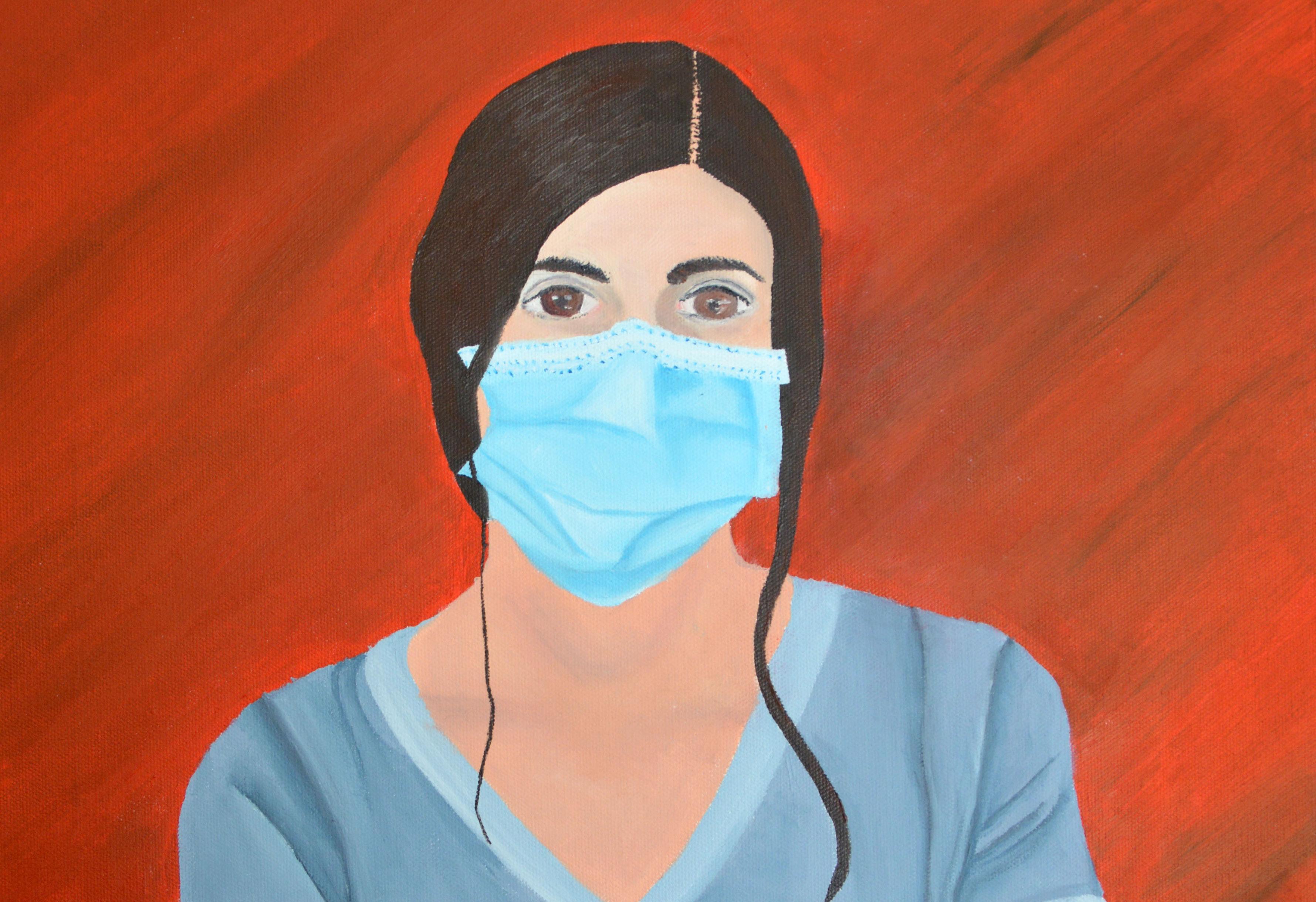
During family gatherings, and holidays especially, my family would always ask me, “What are you deciding on doing in the future?” or “How is school going?” This was always super overwhelming to me because sometimes I question myself because I sometimes don’t really know what I want to do. I’ve always been someone who overthinks everything, so when I would respond by saying “I want to be a PA” I would even question that and just spiral from there.
I’ve worked at a nursing home as a health aide since my freshman year. This job has really opened my eyes to the importance of assisting others and showing compassion. It feels good to help others because you leave with this amazing feeling and a smile on your face. It is a very rewarding experience. While I have been at the nursing home, I’ve noticed the importance of saying things such as “How has your day been?” or “Goodnight!” and how it can really have an impact on the patients' lives. I always treat them the best I can because I know that one day that will be me or my parents and I would want to be treated respectfully. My grandpa was in a nursing home and he would always get visitors from our big family, but that's not the case for everyone. He started to get sick very quickly and had to be admitted to a nursing home. When he was admitted, I think that's when I realized that I wanted to for sure do something in healthcare.
Seeing the nurses help him really made me want to do the same in a sense. The idea of helping people really made me happy, and that’s what I loved about it. I remember when I was younger, my teachers would give us papers saying on the top, “What do you want to be when you grow up?” I’d always draw a doctor. I remember always wanting to be a dermatologist because the science behind it fascinates me. Skin is the biggest organ of our body and there is just so much to it. I have always been into skincare and loved what a dermatologist would do and how they could specifically help others. I later realized that I wanted to be a Physician Assistant instead, working in a private practice consisting of skin and cosmetics. It was less school and seemed like the best fit for me. I just want to make a difference in an individual’s quality of life and love the freedom I have to explore different specialties of medicine that becoming a PA gives me. I will still be able to diagnose, treat, and examine patients, just under the supervision of a physician. I like this. I still have a lot of flexibility with the job and it's still just as rewarding.
I now know that I for sure want to become a Physician Assistant and no longer question myself. I hope my passion for helping others helps me on my college journey so I can eventually become a PA and fulfill my dreams of always being able to assist others.

CREDITS
1. PHOTO BY RINTARO HIROTA, TOKYO, JAPAN
2. ARTWORK BY ELLIE BRUBAKER, HOUGHTON, NY
3. ARTWORK BY CHERRY GAO, NEWTOWN, PA



With inflation surging exponentially, it has become vital for people, especially college students, to manage their finances effectively to survive. In the current state of the global economy, the best strategy is to strive to achieve financial independence.
The most conventional method of managing finances that is often overlooked is budgeting. Budgeting not only allows one to keep track of their expenses but also guarantees priority-based expenditure, an achievement in and of itself. The integral components of budgeting include tracking expenses, setting short and long-term financial goals, and prioritizing spending. Some applications that can assist in budgeting include Goodbudget, Mint, and PocketGuard. Also, there are numerous other options available online.
IN THE CURRENT STATE OF THE GLOBAL ECONOMY, THE BEST STRATEGY IS TO STRIVE TO ACHIEVE FINANCIAL INDEPENDENCE
Before attempting to minimize expenses, one must identify the main areas of their spending. After
reviewing expenses, the second step involves setting financial goals. It is important to start by setting a long-term vision, followed by its dissection into appropriate, short-term, manageable chunks to ensure a smooth transition. One must also keep a proper fiscal record and revisit their goals frequently.
The final step consists of ordering expenses according to individual priorities and allocating a specific ratio of income to each sector. It is also important to save a set percentage of one’s income for emergency purposes. It is also advisable to invest some savings in multiple appropriate avenues to maintain cash fluidity and successful returns.
One of the main steps toward gaining financial freedom is to minimize one’s expenses. This can be achieved by eliminating excess expenditure and managing the rest. Often, this might be difficult, but one has to curb one's ego and take harsh steps because everything worthwhile demands sacrifice. Some ways students can cut down their expenditure is to buy used textbooks and make use of e-books and free PDFs of relevant course material. Secondly, one can prefer cheap lodging and homemade meals. Moreover, one should make full use of student discounts and concessions where available. Additionally, one can avoid frivolous expenditures and refrain from attending unnecessary ceremonies including proms, parties, and more.

Apart from managing expenses, college students should strive towards supplementing their income, whilst making use of leisure time. Although the avenues of income may vary from person to person, some general side hustles include: freelancing, tutoring, and working part-time and odd jobs. Similarly, entry-level remote jobs may also be a good starting point in the important junction of self-financing through college. However, when selecting a hustle, it is recommended to consider a variety of factors including pay, extent of involvement required, feasibility, and alignment with the individual’s interests. It is always recommended to perform proper research before making such crucial life-changing decisions and to seek advice from fellow peers and elders.
Some students may consider using credit to aid in their financial journey. However, it is important to realize and analyze the risk factors involved in such decisions. The pros and cons of the matter should be weighed before arriving at a final decision. It is also advisable to seek advice from trustworthy people including seniors and relatives among others. It is also important to pay off credit in full, and as quickly as possible to avoid incurring interest and getting burdened by debt. Additionally, one can also invest credit in high-return and low-risk avenues. Overall, it is an individual choice one has to make about utilizing credit.
To sum it up, there are a variety of ways college students can achieve financial success. These include proper budgeting, setting financial goals, and managing expenditures and investments in appropriate places.
COLLEGE STUDENTS SHOULD STRIVE TOWARDS SUPPLEMENTING THEIR INCOME, WHILST MAKING USE OF LEISURE TIME
Finally, I would like to reiterate the importance of financial freedom and its never-ending benefits including reduced stress and anxiety levels, selfsufficiency, and the ability to pursue personal goals without any restrictions. So, to secure a financially free future, we must start today — now, this very moment — because there is no greater loss than a moment wasted. As Rob Berger said and I quote, “The best thing money can buy is financial freedom.”
During my college application process, I expected that my nerves would run deep. Between creating a list of schools, filling out endless information on application portals, and finding a roommate, I thought my mind might explode. However, for myself and many of my graduating peers, the overarching concern that overshadowed our doubts was money. How is it that we are supposed to pay up to 80 thousand dollars per year for our studies with our minimum wage occupations? Receiving our financial aid packages only solidified this fear. If there are solutions to minimizing student fees, why don’t we pursue and implement them?
The rise of technology in the last decade has allowed us to notice the obvious benefits and drawbacks; however, in its many split uses, we have learned to appreciate the advantages of technology and find it difficult to imagine a life without it. What we fail to recognize in one of technology’s uses is the power it
holds in higher education. I don’t just mean using it for a Google search to gain quick knowledge, but using it as an academic opportunity for trained professionals and class materials. According to the Education Data Initiative, “25% of students reported they worked extra hours to pay for their books and 11% skipped meals in order to afford books and course materials.” Not to mention that the average textbook is estimated at about $105.37, while the average student pays around $1,226 on books in just one academic year. If we factor in the amount that a student spends at a university for a total of four years, students would be paying around $4,904 on top of their tuition, fees, housing, food plans, and more, just to have the resources to pass their classes.
MANY STUDENTS MAY HAVE SAVED MONEY ON FEES SIMPLY DUE TO THEIR TEXTBOOKS BEING DIGITAL
The e-book industry has seen a rise during the years of COVID-19, increasing by about 12.6 percent, according to Good E-Reader. This means many students may have saved money on fees simply due to their textbooks being digital. The use of these e-books has been known to make sharing group ideas more efficient as well as making copies of excerpts into lesson plans less stressful on staff members. In the future rise of this new learning style, students may not have to factor in the excessive payments on their books and still be able to afford their classes. With extreme technological advancements, there is no doubt that the textbook industry could begin its conversions.
It’s hard to find a textbook less than 200 pages, each a piece of paper. Statista examines that the United States consumes 65.6 million metric tons of paper per year. Textbooks and the issue of their involvement in the paper trail can be easily resolved with the solution of digital downloads. The 200-plus pages of paper that may be saved with every digital textbook downloaded rather than the paper being purchased could prevent deforestation, energy use, and problems of waste.
1. ARTWORK BY VERA PENG, NEW YORK, NY
ARTWORK BY ELLIE BRUBAKER, HOUGHTON, NY
ARTWORK BY ANONYMOUS
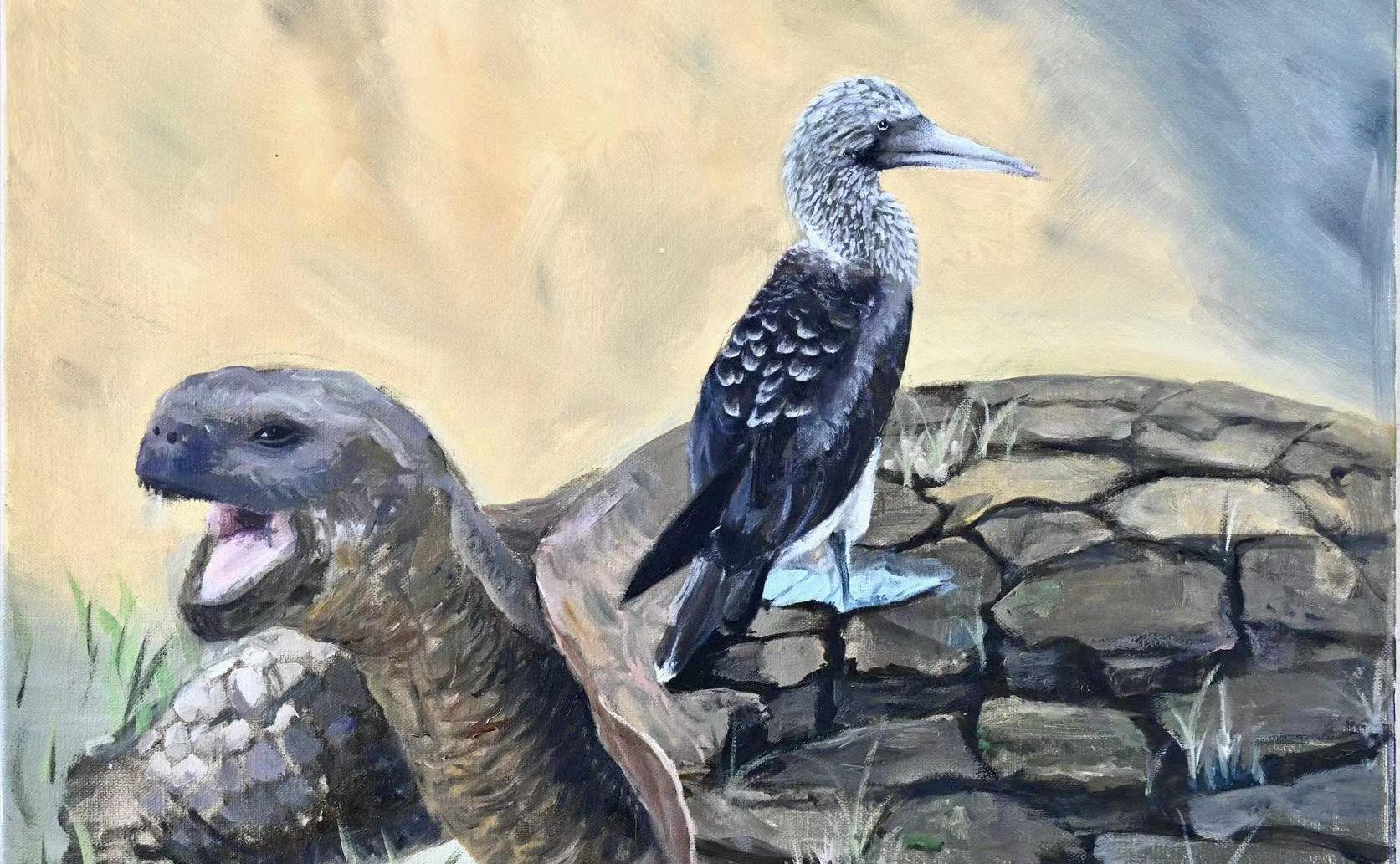

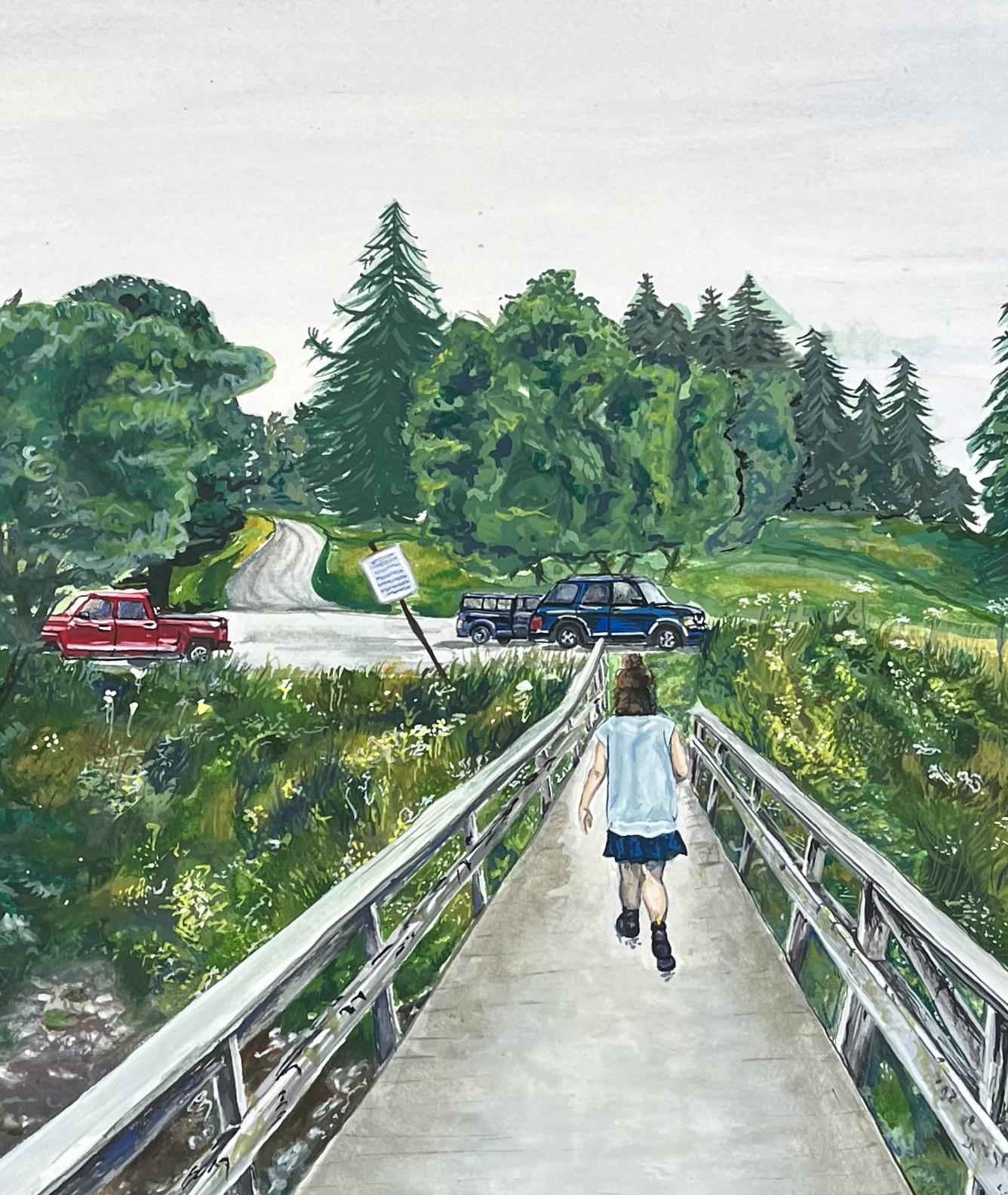
BY
My essays are done, and my Common App is filled. Stressful days pass as I wait.
Scholarships, missed bucket lists, one-way tickets — the unease now hits.
I’m eager, to some degree. I leave home, yet I’m still me.
BY ALAN WHITMOYER, OCONOMOWOC, WICandles blow—the big one-eight—the world cracks open. It's time to go.
Out the door—A set of keys—Don't look back. At last, I'm free.
Through the glass, four eyes watch my back; so many years have come to an end.
BY LOGAN WALKER, HARTLAND, WIIn the shadows I linger, walking the halls alone by myself.
Whispers of friendship spiral around me in these lonely halls.
College looming over my head, with hopes I don't linger again.
BY GABRIELLA HOFFMAN, HARTLAND, WI
“When I finally arrive thereAnd it will take many days and nightsI would like to believe others will be waiting And might even want to know how it was.”
The next chapter of my life is about to begin.
The unknown is scary to think about. Living in a new place with new people.
What if I hate it?
I’ll miss my loving parents, my bright room with my blue bed sheets, and having my own bathroom.
I’ll miss my hometown friends and my cat.
But what if I thrive? What if I love it?
I’ll make new friends.
I’ll love the new environment. I will be able to come home for breaks to see my friends and family. It will be like a long vacation.
When I finally arrive there, I hope I love it I hope I don’t get homesick. I hope it becomes my new home. When I finally arrive.
BY ANONYMOUSIn high school, we walk around, Life’s ups and downs, our stomping ground.
Lockers loaded with dreams and fears, Laughs and cries, through the years.
Classes pass by, like a dance, Figuring life out, taking our chance
Teachers help us find our way, Through lessons learned day by day. Friends keep us steady, through thick and thin,
Sharing everything, a bond within. Friday nights, under stadium lights, Weekend adventures, reaching new heights.
Crushes come, hearts skip a beat, Nervous smiles, awkwardly sweet Love’s a puzzle we try to solve, Learning lessons as we evolve.
But beneath it all, worries loom, Trying to find ourselves in this room
Pressure slowly builds, expectations rise,
As we search for the truth in disguise. Yet in the chaos, there’s beauty bright, In simple moments, day or night. In setbacks, lessons to be learned, In challenges faced, bridges burned.
So here’s to high school, living wild and free,
A time to grow, to just be.
Though fleeting, these years, we adore, As we step into the world, wanting more
BY ANONYMOUSThe earth rumbles and shakes below
As the wind whistles and screams
The ground splits beneath my feet
As the sky above me dreams
Angry clouds swirl and dance
Trees and bushes twirl and prance
The storm around begins to brew
The cloud above I can’t see through
When the water in the sky
Aims and shoots and hits my eye
I have a sudden realization
The apocalypse is nigh.
BY ANT ZMUDA, MANCHESTER, CTIn scrubs all blue, they stand so tall
Nurses answer the healing call
With a tender touch and gentle smile
They go the extra mile
From the first breath to the final exhale
Nurses are there, never really asking why
They comfort, they care, they hold your hand
Guiding you through a journey so grand
In crowded halls and quiet rooms
Nurse they calm the fears and gloom
They listen, they support, they understand
A guardian angel, lending a helping hand
Through long shifts and sleepless nights
Nurses shine with their steady lights
They bring comfort, amidst the strain
Nurses are heroes without a cape, caring and kind
With healing hands and compassionate minds
They tend to the sick, young and the old
Their heart full of warmth, their spirits bold.
BY ANONYMOUSIn shadows deep, the moonlight weaves, Whispers dance among the leaves. Stars above in silent song,
Night's embrace where dreams belong.
A symphony of twilight grace, Earth and sky in soft embrace. Mystery fills the midnight air, A tapestry beyond compare.
Let your heart with wonder swell, In this enchanted, secret spell.
For in the night, all mysteries lie, Beneath the moonlit, starlit sky.
BY KYLER MCCLAIN, CENTERVILLE, IAWhispers lost in rain, Empty seat holds silent pain, Leaves fall, unanswered.
BY POLINA PERIN, ESPLUEGUES DE LLOBREGAT, SPAINThoughts swirling, a constant stream, In my mind, a vivid dream.
Overthinking, a familiar plight, As thoughts dance, day and night.
Each idea, a whirlwind of its own, A carousel of thoughts, endlessly thrown.
Analyzing, dissecting, never at ease, Caught in a web of mental unease.
But amidst the chaos, a lesson I've learned,
To let go, and let my thoughts adjourn. For in the quiet, clarity will find,
A peaceful state, a tranquil mind.
So I'll take a breath, and let go of the rush,
Embrace the stillness, in silence I'll hush.
For in the space between thoughts, I'll find,
A peacefulness that eases my mind.
BY BROOKLYN WEBB, CHESTER, IL
You say my voice careless your ear, While you lend me yours;
You say there’s a seed sprawling down there yonder
Light rimming our shadows; Your heart stand there yonder.
You say my hand touches your wing, While you give me yours;
You see there’s a flower blooming in the river yonder
Color intruding our minds; Your silhouette stands there yonder.
You ask what will become of me
When the seed wither And the flower turn to dust
I say
The seed wither only when a flower bloom
The flower sheds dust over Ophelia’s still beating heart. The river flows on and our spirit flows on yonder.
BY ANONYMOUS
nighttime holds a special place in my heart for at night, you experience life uninterrupted
so come, darling sing your melodies to the nightingales on the windowsill oh, my darling the night is yours to love count the stars for me, would you? and the blades of grass in your lawn tell me their stories they'll whisper their secrets if you listen close enough
so come, darling sing your melodies to the nightingales on the windowsill oh, my darling the night is yours to love
dance, my dear moonlight only lasts so long
and the soft silver glow makes every dance a special one
so come, darling sing your melodies to the nightingales on the windowsill
oh, my darling the night is yours to love
BY KATANIYA MARKUS, TORONTO, ON, CANADAOh, how the days of summer flew by so fast,
A season full of warmth and endless laughter, The sun shone bright, the breeze was light and free,
And life was simple, wild and carefree.
The trees were green, the flowers bloomed,
And every day was a golden tune, The birds sang sweet, the bees buzzed with glee,
In summer's embrace, all was aglow.
The days were long, the nights were short,
And every moment was a precious thought,
The warmth on skin, the cooling breeze, Were joys that brought us to our knees.
But now, the winds have changed, the days are gone,
And winter's chill has come upon, The trees stand bare, the flowers have faded, And summer's magic has been shaded.
Oh, how we miss the sun's warm touch,
The laughter, the joy, the simple such, The carefree days, the endless fun, That summer brought, our hearts have won.
But memories remain, a treasure trove, Of laughter, love, and endless love, And though the season's gone, its grace,
Will stay with us, a shining face.
So let us hold on to these memories, And cherish them, as they bring us peace,
For though summer's gone, its magic stays,
And in our hearts, it will forever be.
BY ALI TUCKER, EDMOND, OKIn the cozy corners of my home, Where sunbeams dance and shadows roam,
I prowl with grace, my kingdom grand, With every step, I take command.
With eyes so bright, I see it all,
The mice that scurry, the birds that call, I'm stealthy, swift, and oh so sly, A hunter born, I'll never comply.
But in the quiet of the night, When the world is still, devoid of light, I curl up close, a purring ball, Content and safe within these walls.
And as I dream of moonlit chases, Of secret adventures in hidden places, I am reminded, with every breath, That in this house, I've found my truest rest.
So let me roam, let me explore, In this house, I am forevermore, A cherished friend, a furry guide, In this house, I'll always reside.
BY BROOKLYN WEBB, CHESTER, ILI greet the butterflies with a wistful sigh. A puff of air, and the memory of you.
The world made them for you, and now you're everywhere.
BY ANNABELLE BACKES, TAIPEI, TAIWAN
Life is a journey, full of twists and turns, A tapestry of moments, each one a lesson learned.
Sometimes it’s sunny, sometimes it rains,
But through it all, we grow and change.
We face challenges that test our might,
But they make us stronger, like a shining light.
Life is a canvas, waiting to be painted, With colors of joy, love, and moments untained.
The sun sets low, painting skies with grace, Reminding us gently of life’s steady pace.
Stars twinkle above, secrets they keep, As we drift into dress, in the arms of sleep.
Life’s a symphony, with highs and lows,
A rhythm of peace, as the gentle wind blows.
So take a deep breath, let your spirit fly free,
For life is a song, a sweet melody.
So let’s embrace each day with open hearts, Cherishing the beauty, the highs, and the arts.
For life is a gift, a precious treasure, Let’s make the most of it, and live with pleasure.
BY CAITLYN YORK, KOSHKONONG, MOWarm air is flowing
The water crashes on shore
Summer soon to come
BY ANONYMOUSIn fields of gold, where sunlight weaves Your petals sway, delicate as lace. Your leaves whisper in the wind
Your bright colors paint a canvas of love as birds soar above
As you grow Your blooms unfold
To make fields of stories, untold
With your wonderful fragrance and Shining rays of color
Flowers are all sisters and brothers
In Winters’ bite, you shrivel up
But hide in wait, for the sun
In Springs’ embrace, you thrive.
Through the rain and wind, you stand, From bud to bloom and back again, Your life may be short, but you see a lot
Stretched out beyond
The forests of green and meadows of gold, What a sight to behold!
Forever cherished, In Nature's home.
BY ABBY STRICK, READING, PA
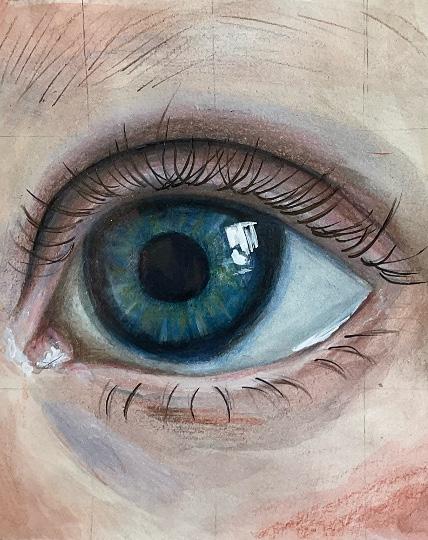
CREDITS
1. ARTWORK BY LYDIA VAZ, SAN JOSE, CA
2. ARTWORK BY ERIS LEE, DALY CITY, NY
3. ARTWORK BY MING CHUEN CHEN, SHANGHAI, CHINA
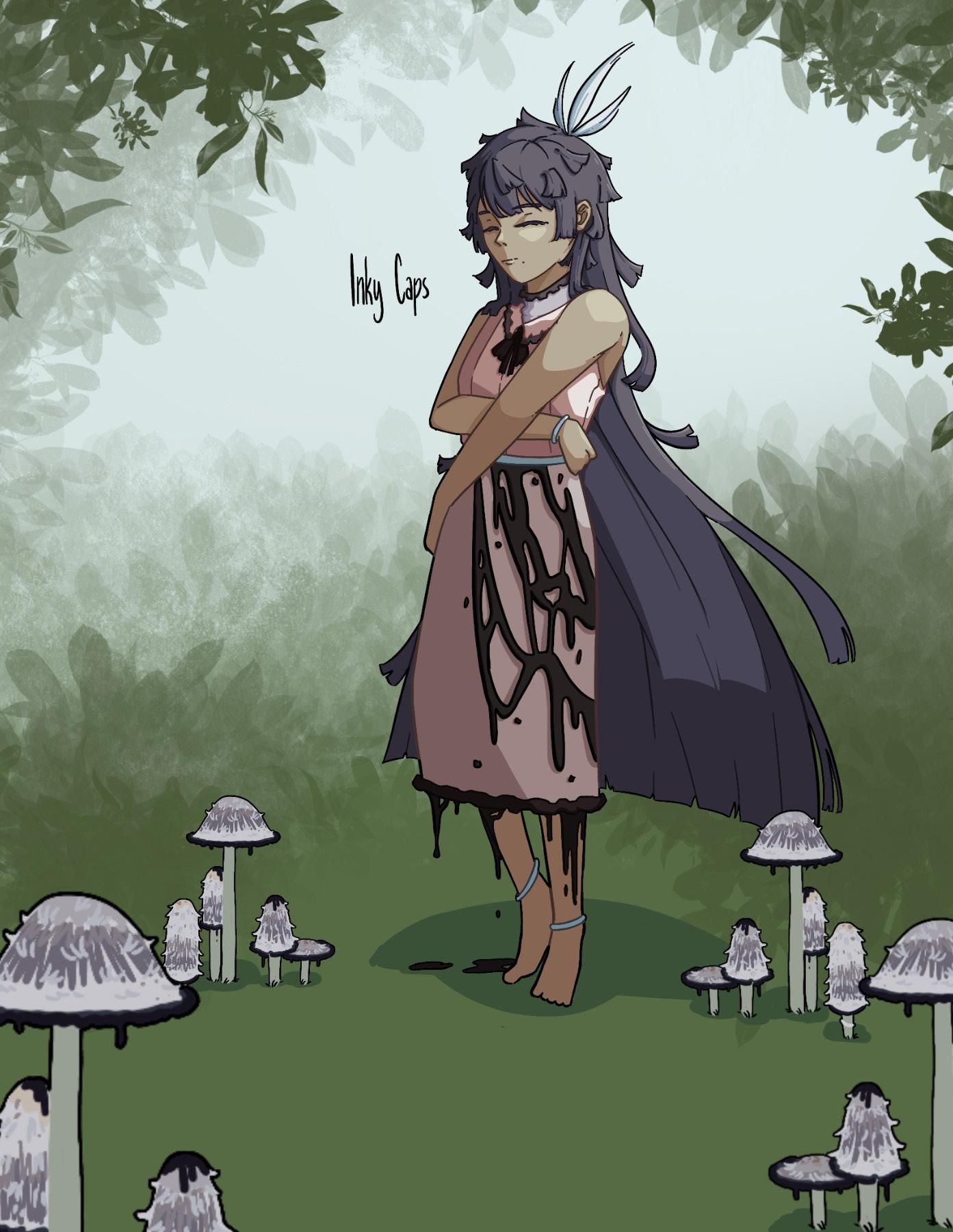
3 1 2

The Next Step
Daylon Lopez-Reyna, 6
Anonymous, 8
Jennifer Chen, 10
Anonymous, 12
Testing & Admissions
Mallory Dent, 14
Zoe P., 17
Choosing a Career
Matthew Acevedo, 18
Michael Vellucci, 20
Anonymous, 22
Finance in Education
Anonymous, 24
Summer Garrepy, 26
Poetry
Alan Whitmoyer, 28
Logan Walker, 28
Gabriella Hoffman, 28
Anonymous, 28
Anonymous, 28
Ant Zmuda, 29
Anonymous, 29
Kyler McClain, 29
Polina Perin, 29
Brooklyn Webb, 29
Anonymous, 30
Kataniya Markus, 30
Ali Tucker, 30
Annabelle Backes, 30
Caitlyn York, 31
Anonymous, 31
Abby Strick, 31
Art Gallery
Dasha Shek, Front Cover
Shayan Ali, 6
Ellie Brubaker, 8
Grace Wilcox, 10
Ellie Brubaker, 12
Chenglin Wu, 13
Alexis Choi, 13
Cherry Gao, 13
Miaofu Tian, 14
Anonymous, 16
Lydia Vaz, 18
Su Mingxuan, 20
Whitney Cohen, 22
Rintaro Hirota, 23
Ellie Brubaker, 23
Cherry Gao, 23
Vera Peng, 27
Ellie Brubaker, 27
Anonymous, 27
Naina Singh, 28
Olivia Green, 29
Lydia Vaz, 31
Lydia Vaz, 32
Eris Lee, 32
Ming Chuen Chen, 32
Macee Compton, Back Cover
Managing Editor: Kylie Andrews
Consulting Senior Editor: Cindy W. Spertner
Consulting Editor: Jada Smith
Sales Account Executive: Sara Shuford
